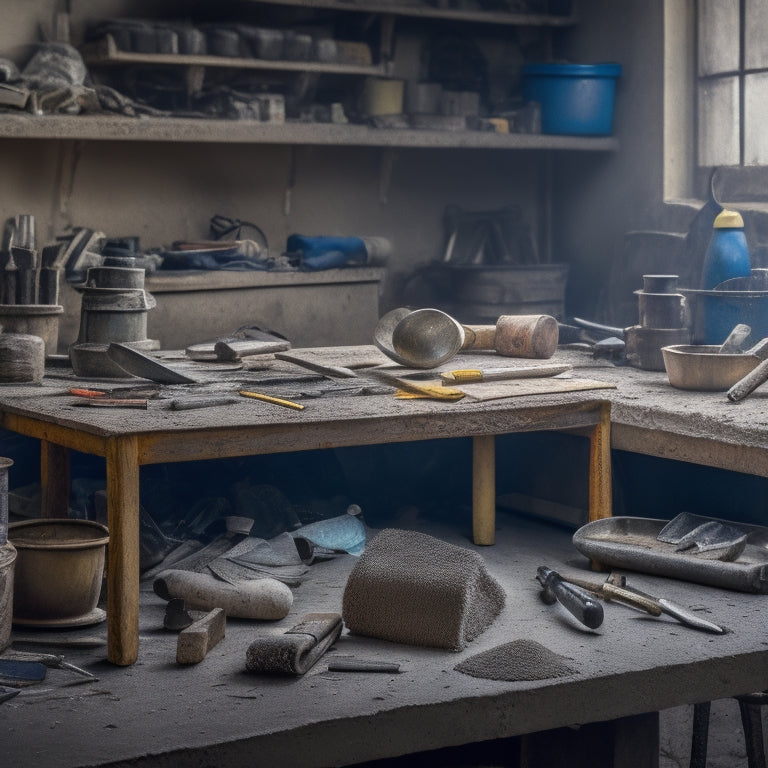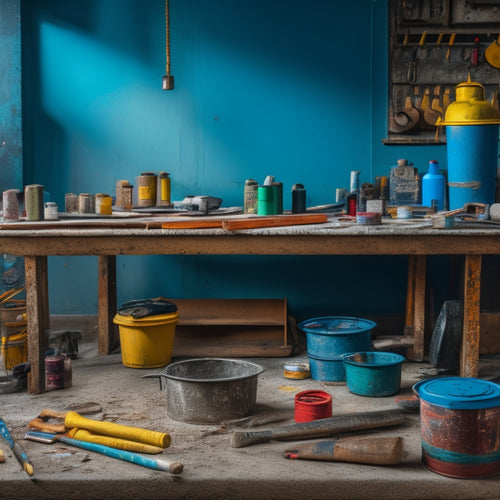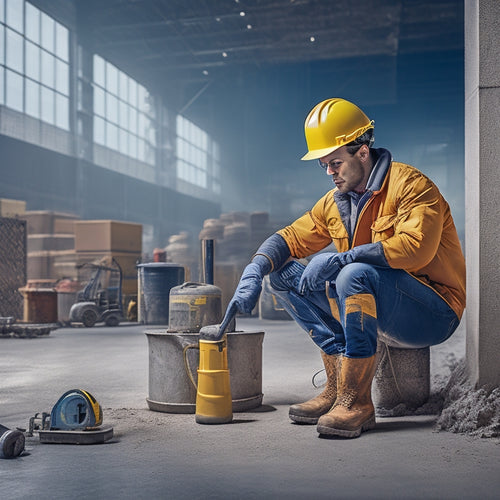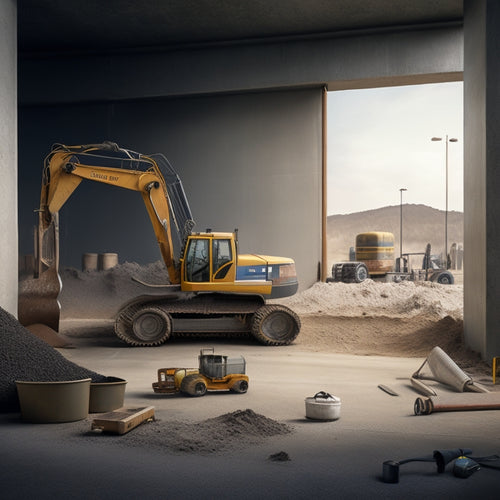
5 Must-Have Tools for Concrete Block Repair
Share
When tackling a concrete block repair project, you'll need the right tools to guarantee success. A reliable sealant applicator, matched to your sealant type, is essential for a strong bond. A durable trowel, chosen for its design and material, will help you apply mortar efficiently. Don't forget essential safety gear, such as goggles, gloves, and a dust mask, to protect yourself on the job. Regular tool maintenance and a quality mixer bucket are also must-haves. By investing in these five critical tools, you'll be well on your way to a successful repair - and discovering the finer details that will take your project to the next level.
Key Takeaways
- Select the right sealant applicator for the job, considering factors like sealant type, viscosity, and project size to ensure a strong bond.
- Invest in a durable trowel designed for the specific task, such as a V-notched or square-notched trowel, to achieve the desired finish.
- Wear essential safety gear, including goggles, gloves, dust masks, steel-toed boots, and a hard hat, to protect yourself from hazards.
- Regularly clean and maintain your tools to prevent concrete buildup and equipment failure, and store them in a clean, dry area.
- Invest in a high-quality mixer bucket with a rust-resistant coating, sturdy handle, and non-slip bottom to efficiently mix and apply concrete.
Choosing the Right Sealant Applicator
Selecting the right sealant applicator is vital when tackling concrete block repair, as it directly impacts the quality and longevity of the sealant bond.
You'll need to evaluate the type of sealant you're working with, as different sealant types require specific applicators. For instance, polyurethane-based sealants typically require a caulk gun, while epoxy-based sealants need a specialized epoxy applicator.
When selecting an applicator, you should also reflect on the application technique you'll be using. Will you be applying the sealant in a bead or a fillet? Different applicators are designed for specific techniques, so it's important to choose one that matches your approach.
Additionally, take into account the size of the area you need to seal and the viscosity of the sealant. This will help you determine the correct applicator size and type.
Selecting a Durable Trowel Design
A sturdy trowel is an indispensable tool in concrete block repair, as it helps you efficiently spread and smooth out mortar, adhesives, and other materials. When selecting a durable trowel design, you'll need to take into account the type of trowel and its material.
There are several trowel types to choose from, including V-notched, square-notched, and round-edged trowels, each suited for specific tasks. For instance, V-notched trowels are ideal for applying and spreading thick layers of mortar, while square-notched trowels are better for applying thin layers.
Trowel materials also play a vital role in durability. Stainless steel and aluminum trowels are popular choices due to their corrosion resistance and lightweight design. However, they can be prone to bending and may not withstand heavy use.
On the other hand, carbon steel trowels are more durable and resistant to bending, but they may rust if not properly maintained. You'll need to evaluate the pros and cons of each material to choose the best trowel for your specific needs.
Essential Safety Gear for Operators
As you prepare to tackle concrete block repair projects, don't overlook the vital importance of essential safety gear for operators.
You'll be working with heavy materials, power tools, and potentially hazardous chemicals, so it's imperative to prioritize your safety above all else.
First and foremost, you'll need a pair of safety goggles to protect your eyes from debris, dust, and chemical splashes.
Look for goggles with shatter-resistant lenses and a snug, comfortable fit.
Next, invest in a pair of protective gloves that offer grip, dexterity, and abrasion resistance.
You'll want gloves that can withstand the rigors of handling rough concrete blocks and power tools.
In addition to these must-haves, consider a dust mask or respirator to safeguard against airborne contaminants.
Steel-toed boots and a hard hat will also provide essential protection for your feet and head.
By wearing the right safety gear, you'll be able to focus on the task at hand, confident that you're protected from harm.
Tool Maintenance and Repair Tips
You've got your safety gear in check, now it's time to guarantee your tools are in top condition to tackle concrete block repair projects efficiently.
Regular tool maintenance and repair are essential to preventing equipment failure, reducing downtime, and ensuring peak performance. Start by establishing a routine for tool cleaning, paying particular attention to moving parts and areas prone to concrete buildup. Use a wire brush or cloth to remove debris, and apply a rust inhibitor to metal components.
Next, inspect your tools for signs of wear and tear, addressing any issues promptly to prevent them from becoming major problems. Proper equipment storage is also critical, as it helps protect your tools from environmental factors and prevents damage.
Designate a clean, dry area for storage, and consider using toolboxes or bags to keep items organized and easily accessible. By following these tool maintenance and repair tips, you'll be able to complete your concrete block repair projects quickly and effectively.
Investing in a Quality Mixer Bucket
Investing in a Quality Mixer Bucket
Pick up a mixer bucket that's up to the task of handling heavy concrete block repair projects. A high-quality mixer bucket is vital for mixing and transporting concrete efficiently.
Look for mixer bucket features that prioritize durability, such as heavy-duty steel or fiberglass construction, and a rust-resistant coating to guarantee longevity. A mixer bucket with a sturdy handle and comfortable grip is also important for reducing fatigue during extended use.
When selecting a mixer bucket, consider reputable brands like Marshalltown, Kraft Tool, or Bon Tool. These brands offer a range of mixer bucket models with varying capacities, from 1-5 gallons, to suit your specific project needs.
Additionally, some mixer bucket brands offer specialized features, such as non-slip bottoms or built-in mixing paddles, which can enhance your concrete block repair workflow.
Frequently Asked Questions
How Do I Remove Old Mortar From Concrete Block Surfaces?
You'll master mortar removal techniques by using a hammer and chisel, wire brush, or grinder to carefully dislodge old mortar, then follow surface preparation tips to clean and etch the concrete block surface for ideal repair.
Can I Use a Drill to Mix Small Batches of Repair Compound?
When mixing small batches of repair compound, you'll find a drill with a mixing paddle attachment is ideal, as it guarantees a consistent blend and avoids over-mixing, which can alter the compound's consistency and compromise its strength.
What Is the Recommended Ratio of Sand to Cement for Block Repair?
Did you know 70% of concrete repairs fail due to incorrect mixing ratios? For block repair, you'll want to aim for a 1:1 to 1.5:1 ratio of sand to cement, depending on the mortar type and mixing technique, to guarantee a strong and durable bond.
How Often Should I Inspect My Tools for Signs of Wear and Tear?
You should inspect your tools regularly, ideally every 1-3 months, to catch signs of wear and tear, ensuring peak performance and extending their lifespan through proactive tool maintenance, which is essential for efficient and effective concrete block repair.
Can I Reuse Old Concrete Blocks in My Repair Project?
You're about to initiate a repair project, coincidentally, at the same time you're pondering whether to reuse old concrete blocks, which begs the question: will their worn block aesthetics compromise your repair techniques, or can you still achieve a flawless finish?
Conclusion
As you prepare to tackle that concrete block repair job, remember that having the right tools is like holding the keys to a fortress - it's the difference between a sturdy foundation and a crumbling mess. With these five must-haves in your arsenal, you'll be building a wall of strength, brick by brick, and sealing your reputation as a master craftsman. So, gear up and get ready to lay the groundwork for a job well done!
Related Posts
-

Essential Tools for Painting Concrete Walls
When painting concrete walls, you'll need a range of specialized tools to achieve a professional-looking finish. Star...
-

10 Best Tools for Sealed Concrete Flooring on Budget
When starting on a sealed concrete flooring project on a budget, you'll need to prioritize essential tools without sa...
-

Why You Need Affordable Concrete Wall Construction Tools
You need affordable concrete wall construction tools to guarantee a profitable project, as the cost of equipment can ...


